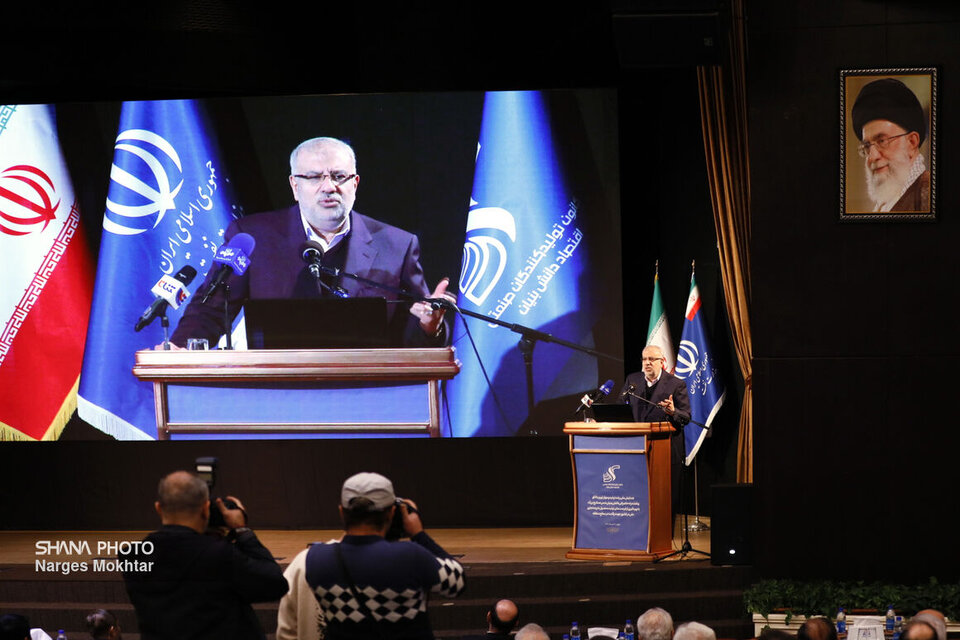Delivering speech at the National Conference on Production Growth, Inflation Control with Governance Model and Roadmap for Having Knowledge-Based Big Industries by Taking Opportunities to Produce National Brands to Compete at Regional Level, the minister added, “To this end, there is a need to use domestic expertise and therefore 753 contracts were signed with knowledge-based companies involved in oil industry last year.”
The number of domestic knowledge-based firms cooperating with the government stood at 150 when the 13th administration took over, but the figure has now risen to 650, he said.
Touching upon domestic oil industry’s achievements, he said enemies failed to prevent its development in spite of sanctions, adding, “Investment of around $150 billion in the Pars Special Economic Energy Zone (PSEEZ) in recent years and exports of technical and engineering services to other countries are among the major achievements.”
Owji said the development process has taken place under all governments, but it has been fortunately accelerated under the 13th administration.
The country was faced with big challenges to oil exports in August 2021, when the 13th administration took office and sanctions were ramped up, recalled the minister, adding the challenges were beaten off and completion of 133 partly-finished key projects worth $28.5 billion was put on the agenda with the aim of increasing production.
Elaborating on oil industry’s achievements under the 13th administration, he said, “Oil production has jumped 60 percent, natural gas and gas condensate outputs have topped one billion cubic meters (bcm) and 760,000 barrels per day, respectively, petrochemical production capacity has soared to 95 million tons per year, oil refining capacity has witnessed a 230,000-barrel increase per day by launching Phase 2 of the Abadan Refinery development plan, and gas processing capacity has increased by 50 million cubic meters per day (mcm/d) as part of a plan to boost production and processing capacities by putting the refinery of SP Phase 14 into operation.”
He also referred to implementation of 50 new projects aimed at increasing output and creating added value in upstream and downstream sectors, underlining, “Around 2.2 million barrels will be added to the country’s refining capacity when the new projects come on stream.”
Projects for promoting quality of products have started, said Owji, naming the project for improving quality of Isfahan Refinery’s diesel by applying expertise of domestic knowledge-based companies and experts.
Shifting to the SP Phase 11 development project at the zero border point, the oil minister said all operations were carried out by Iranian experts under the 13th administration while it contract signed with foreign companies was handed off for long years.
Five wells have become operational and 12-15 mcm/d have been added to the country’s gas recovery capacity, explained Owji, stating the added figure will soar to 50 mcm/d when the operations of its wells are completed.
APG collection, economic growth
Approximately 11 mcm of associated petroleum gas (APG) are now captured per day, said the oil minister.
The volume of APG to be gathered daily will reach around 17 mcm by the end of this winter and will jump to about 40 mcm by the end of the 13th administration’s term (August 2025), he continued.
Talking about oil and gas industry’s economic growth, Owji said, “According to the reports of the Statistical Center of Iran (SCI) and the Central Bank of Iran (CBI), the industry’s economic growth surpassed 25 percent in summer 2023, which will not hopefully less than 20 percent in the Iranian calendar year (ending March 19, 2024).”
Predicting an annual eight percent growth in the country’s 7th Five-Year National Development Plan (2022-2026), a roadmap for an around 5.5-million-barrel-per-day output has been provided, he pointed out and continued that participation of Iran’s big contractors is required for achieving the goal.


Your Comment